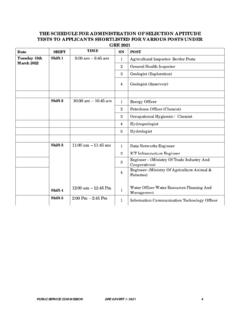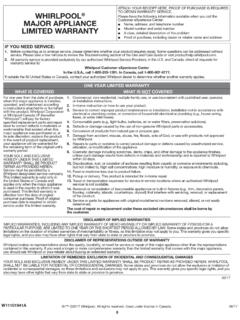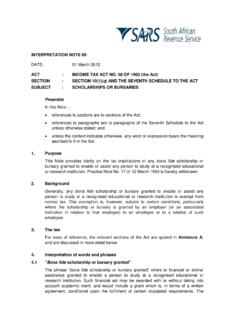Transcription of Elective home education - GOV.UK
1 Elective home education Departmental guidance for parents April 2019 2 Contents Contents 2 Summary 3 About this departmental guidance 3 Expiry or review date 3 Who is this guidance for? 3 Introduction 4 1. What is Elective home education (EHE)? 5 2. What is the legal position of parents who wish to home educate their child? 6 What is efficient education ? 7 What is a full-time education ? 7 What is a suitable education ? 7 What about children s rights? 9 3. So what do I need to think about before deciding to educate my child at home ? 10 4. If I choose to educate my child at home , what must I do before I start? 13 5. What are the responsibilities of your local authority? 14 How does the safeguarding role of the local authority affect parents educating children at home ? 16 What is the local authority s role if my child has special educational needs? 17 Is there any oversight of local authority operations in relation to Elective home education ? 19 6. Further information 20 Safeguarding at home 20 Attending other settings 20 National Careers Service 21 Work Experience 21 16 to 19 Bursary Fund 22 Gypsy, Roma and Traveller Children 22 Children in faith communities 22 Other relevant departmental guidance 23 3 Summary About this departmental guidance This is departmental guidance from the Department for education .
2 It is non-statutory, and has been produced to help parents understand their obligations and rights in relation to Elective home education . Expiry or review date This guidance will next be reviewed by December 2020. Who is this guidance for? This guidance is for: Parents, especially those educating children at home or considering doing so. Parents may also find it useful to consult the local authority version of DfE guidance on home education , published alongside this document. 4 Introduction The government s aim is to ensure all young people receive world-class education which allows them to reach their potential, and live a more fulfilled life regardless of background, in a safe environment. Educating children at home works well when it is a positive choice and carried out with a proper regard for the needs of the child. This guidance is intended to help parents who choose to educate a child at home understand what their responsibilities are, and how those fit with the role of the local authority.
3 In producing this guidance - and the parallel document for local authorities -, the department s hope is that this will result in a position where those parents who wish to educate their children at home and do it well, are helped to do so. However, if parents are in a position where they are educating a child at home but would prefer not to be doing so - or feel pressure to start educating a child at home , but know this will present difficulties - the guidance aims to set out what they need to consider and when they should seek help. The guidance represents the department s view as to the way in which the current legal framework affects the provision of home education . It does not create new powers or duties, and only the courts can make authoritative decisions on the law. 5 1. What is Elective home education (EHE)? Elective home education is a term used to describe a choice by parents to provide education for their children at home or in some other way they desire, instead of sending them to school full-time.
4 This is different to education provided by a local authority other than at a school, for example for children who are too ill to attend school. Throughout this guidance, 'parents' should be taken to include all those with parental responsibility, including guardians and foster carers ( in the latter case the local authority may also be a corporate parent). As a parent you can choose to engage private tutors or other adults, or online tuition, to assist in providing a suitable education , but there is no requirement to do so. There are other settings which may be used, not just the family home . Such settings may well not be regulated in any way so there is no external assurance that they comply with basic standards, such as proper vetting of staff and safeguarding children. Although children being home educated are not normally registered at any school or college, you may choose to make arrangements for a child to receive part of his or her total education at a school ( flexi-schooling ) - or at an FE college or other 16-19 provider if the child is aged 14 or above.
5 The purpose of this will often be to provide education in specific subjects more easily than is possible at home . Schools and colleges are under no obligation to agree to such arrangements, but some are happy to do so. 6 2. What is the legal position of parents who wish to home educate their child? As parents, you - not the state - are responsible for ensuring that your child, if he or she is of compulsory school age, is properly educated. Despite the term compulsory school age , education does not have to be undertaken through attendance at school, even though the parents of any child living in England can request a state-funded school place and the local authority is obliged to find one - or make alternative arrangements for education of your child. There is no legislation that deals with home education as a specific approach. However, Section 7 of the education Act 1996 provides that: The parent of every child of compulsory school age shall cause him to receive efficient full-time education suitable - (a) to his age, ability and aptitude , and (b) to any special educational needs he may have, either by regular attendance at school or otherwise.
6 Elective home education is a form of education otherwise than at school and this piece of legislation is the basis for the obligations of parents. It is also the starting point for local authorities involvement. A child becomes of compulsory school age from the first of the following dates (31 August, 31 December or 31 March) which occurs after she or he becomes five years old (or if the fifth birthday falls on one of those dates, on that day). The child remains so until the last Friday of June in the academic year in which she or he becomes sixteen. Children may also be educated at home in order to participate in education and training until the age of 18. You may also decide to exercise your right to educate your child at home from a very early stage, before he or she reaches compulsory school age. There are no requirements in that case as to the content of any home education provided - since there is no legal requirement for any education to take place at all, although state-funded places of between 15 and 30 hours a week would normally be available in early years settings for children of an appropriate age.
7 Unless otherwise stated, the rest of this guidance is solely concerned with the provision of home education for children who are of compulsory school age. 7 What is efficient education ? There is no definition of this in statute law. However, it can be interpreted as meaning education which achieves what it is intended to achieve . This is not the same as the education being suitable - because it is possible to deliver efficiently an education which is definitely not suitable for the child. Conversely, it is possible to deliver a suitable education very inefficiently. What is a full-time education ? There is no legal definition of full-time in terms of education at home , or at school. Children attending school normally have about five hours tuition a day for 190 days a year, spread over about 38 weeks. However, home education does not have to mirror this. In any case, in Elective home education there is often almost continuous one-to-one contact and education may sometimes take place outside normal school hours.
8 home -educating parents are not required to: have a timetable set hours during which education will take place observe school hours, days or terms In practice, the question of whether education for a specific child is full-time will depend on the facts of each case; but you as parents should at least be able to quantify and demonstrate the amount of time for which your child is being educated. education which clearly is not occupying a significant proportion of a child s life (making due allowance for holiday periods) will probably not meet the requirement. What is a suitable education ? There is no definition of suitable education in statute law, although as stated in as quoted above, it must be suitable to the age, ability and aptitudes of the child, and any special educational needs. This means that it must be age-appropriate, enable the child to make progress according to his or her particular level of ability, and should take account of any specific aptitudes (for example if a child is very good at mathematics, it might focus more on that than some other subjects).
9 More generally, you should bear in mind that: a. even if there is no specific link with the National Curriculum or other external curricula, there should be an appropriate minimum standard which is aimed at, and the education should aim at enabling the child, when grown-up, to function as an independent citizen in the UK - and furthermore, beyond the community in which he or she was brought up, if that is the choice made in later life by the child; 8 b. to be suitable , education at home should not directly conflict with the Fundamental British Values as defined in government guidance (link at end of document), although there is no requirement to teach these; c. local authorities may use minimum expectations for literacy and numeracy in assessing suitability, whilst bearing in mind the age, ability and aptitude of the child and any special educational needs he or she may have; d. education may not be suitable even if it is satisfactory in terms of content and teaching, if it is delivered in circumstances which make it very difficult to work (for example in very noisy premises).
10 This might also affect whether it is efficient and indeed, whether it is received at all for the purposes of ; and e. education may also not deemed suitable if it leads to excessive isolation from the child s peers, and thus impedes social development. There are no legal requirements for you as parents educating a child at home to do any of the following: acquire specific qualifications for the task have premises equipped to any particular standard aim for the child to acquire any specific qualifications teach the National Curriculum provide a broad and balanced curriculum make detailed lesson plans in advance give formal lessons mark work done by the child formally assess progress, or set development objectives reproduce school type peer group socialisation match school-based, age-specific standards However, many home -educating families do some of these, at least, by choice. Furthermore, it is likely to be much easier for you to show that the education provided is suitable if attention has been paid to the breadth of the curriculum and its content, and the concepts of progress and assessment in relation to your child s ability.

















